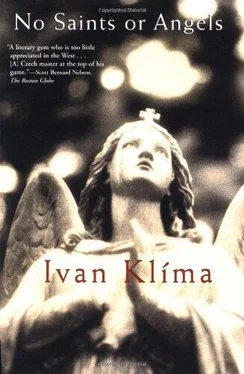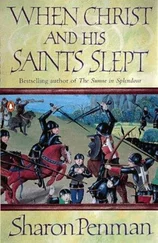But I felt fantastic. I really liked the people here because they were like me and I was like them. We couldn't give a fuck about anything so we were still able to laugh. We were almost always laughing, especially after grass. Someone said, 'Hey it's Wednesday,' and it was Saturday and we were in stitches. I really liked laughing. It was hard to laugh at home. Mum had her downers and was always miserable over Dad totally doing the dirty on her and being alone — only having me, as she said, and that couldn't be enough because sometimes she didn't even have me, like now. I lay there and I felt better than at home and one day I'll stay here totally and the moss will grow all over me and I won't know about anything. And maybe I'll go off somewhere or fly away.
That creep kept on singing about love, as if it existed.
Maybe it does, but it was hiking in the mountains so it didn't get poisoned.
I used to go hiking in the mountains with Mum and Dad, and when my legs ached, Dad would give me a piggyback and Mum would walk behind us and every few minutes she'd say, 'Isn't she too heavy for you? I'll take her for a while.' And Mum would also sing:
'Don't you worry Jana That there's nothing left to eat We'll kill ourselves a juicy midge And cut it up for meat.'
I didn't want to stay here totally, I'd like to go hiking in the mountains.
Maybe I ought to let Mum know I'd like to go hiking in the mountains. With her and Dad.
Dad can hardly climb the stairs and he wouldn't go with Mum even if he could.
There were two sewer rats now. What are you staring at, you creeps?
When Ruda first gave me some grass I was really curious and I was also a bit afraid of what it would do, but it hardly did anything. I didn't know how to drag on it yet and anyway he only gave me a couple of puffs and kept asking me, 'What do you feel? Are you high yet?'
When I got home I was in total dread that Mum would be able to tell, but she wasn't able to tell anything; she happened to be dreadfully tired and miserable; she had a downer and a headache and was pissed off because I didn't do the washing-up.
How could I do the washing-up on a day like that? I wanted to really enjoy being happy and you can't be happy doing the washing-up.
Ruda crept up on to me again, if it was him, and started to touch me up. I didn't care; it turned me on.
Now I'd like to be hiking in the mountains, but not with you, you creep.
1
Dad acquired the burial plot years ago; it lies in a remote corner of Olšany Cemetery. His forebears remained in the country graveyard at Lipová; they have more light and flowers there, and a bell rings over them every day. They include Auntie Venda who burned to death and Grannie Marie. The ashes of my other grandmother were most likely washed away in the river Vistula or were tipped into some mass grave; her name, at least, is inscribed among thousands of others on a wall of the Pinkas synagogue in Prague. When I first saw it there, I found it strange, even unbelievable that my mother's mother should have died that way, and I almost felt guilty about my own untroubled existence and the fact that no one was out to kill me.
At the foot of the grave there is a gaping small hole ready to take the urn and next to it a little heap of earth like a fresh molehill.
His nearest relatives have come: Mum, my sister Lida, Jana and I. We are waiting for the undertakers to arrive with the urn. Mum is wiping tears from her eyes, Jana is evidently bored and staring into the distance with a faraway expression. A gypsy funeral is taking place at the other end of the path and we can hear the sound of dance tunes intended to accompany the soul of the deceased to a happier and brighter world.
'He could have still been here with us; after all he wasn't all that old,' Mum laments.
I refrain from pointing out that Dad was just a few weeks short of seventy-six, which is more than the average longevity of men in this country, nor do I say that how a man lives matters more than how long.
My sister can't restrain herself, however: 'He'd have had to smoke less and keep off the pork fat, the streaky bacon and the cheap smoked meats. I never saw him touch vegetables, apart from a bit of cabbage if it came with the goose or the roast pork.'
Mum senses a personal reproach, as she is the one who fed Dad all his life, and her sobs grow louder.
But now two fellows in shiny black suits emerge from one of the side paths. They are how I imagine the two court bailiffs in The Trial, whose author lies in the adjacent Jewish cemetery. All that's missing is the knife. Instead, one of them is cradling in his arms the urn with the ashes while the other carries a garden trowel in place of a knife. They arrive at our grave, bow to us, and for a moment they both stand in feigned solemnity of mourning.
Then the, first of them leans over the cavity and places the urn in it. The other man offers us the trowel and we sprinkle a bit of soil into the shallow hole, the pebbles rattling off the lid of the urn.
It is all so brief, there's no time for even a flicker of God's eyelid. Nobody sings anything, nobody plays anything; all we can hear are the strains of a passionate csardas from the gypsy burial. Just recently I saw on television some old woman in Moscow defiantly brandishing above her head a portrait of the tyrant who died on the day I was born. Maybe it would gratify Dad if I held a portrait like that now over his grave. But I don't have one and I'd never take it in my hands anyway. I'd happily play the violin for Dad, even the 'March of the Fallen Revolutionaries', if he'd have let me continue learning the instrument.
The two men finish their job and come up to us to express their condolences and wait expectantly for a tip. They get a hundred-crown note each and depart from us at a dignified pace
while we remain standing there for a little while longer. I don't know what's going through Mum's head, or my sister's. Mum has no inkling of Dad's infidelities and will never learn about them now. Maybe she is recalling some nice moments; there must have been some. Maybe she's thinking of the loneliness that will accompany her for the rest of her days.
Dad died at home. He was racked with pain during the final days. A doctor visited him from the clinic and gave him some injection that didn't do much to relieve the pain. I didn't ask what they gave him; most of the time I wasn't around. I myself had a few ampoules of morphine that the thieving ward sister had brought me. I'd never used them but I could have injected them into Dad, all of them in one go even, and thus shortened his suffering. I could have done it; he was already under sentence of death anyway, but I didn't. I couldn't make up my mind to shorten his life and play Dr Death. I had no right to, had I? Or was I just making excuses? To do something like that you have to feel either great love or bitter hatred — I didn't feel either. I didn't have enough compassion for someone who had never shown much pity to others. Subconsciously I told myself that each of us has to put up with our fate right to the end, and that there was even some kind of justice in it, which we oughtn't to interfere with.
'Aren't we going yet?' Jana asked.
We took Mum home and I let my daughter go off to a girlfriend's. My dear sister, who once prophesied my death at my own hand, decided to come back to my place for a chat.
Before we climb the stairs to the flat I check my mailbox and take out the only envelope it contains; by the writing I can tell immediately it's another anonymous letter. I quickly slip it into my handbag before my sister has a chance to ask who's writing to me.
I make a few open sandwiches but Lida refuses them; she's found a new belief: healthy eating. She doesn't touch smoked meats or even cheese. She's not allowed tomatoes because they are
Читать дальше












